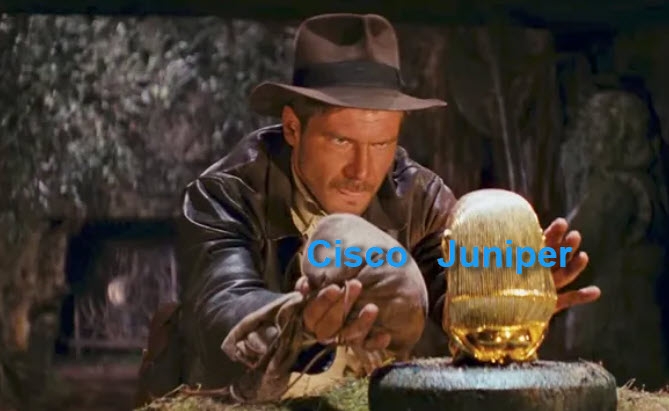Comparing Juniper vs. Cisco Enterprise Product Lines
Market Position & Popularity
Cisco dominates the enterprise networking market due to its long-standing presence, brand recognition, and a broad portfolio across switching, routing, wireless, and security. Juniper, though smaller in market share, offers a strong product lineup, particularly in routing and software-defined networking (SDN), and has a reputation for performance and innovation.
Cisco is widely adopted across all industries, providing comprehensive solutions through its Catalyst and Nexus series for switching, ISR/ASR routers, and Meraki for cloud-managed networks. Cisco's products are well-regarded for their robustness, interoperability, and extensive ecosystem.
Juniper, while less ubiquitous, is highly respected in environments requiring superior routing performance, thanks to its MX series routers and EX/QFX switches. Juniper's Contrail SDN solution and Mist AI wireless platform (which incorporates machine learning) provide cutting-edge automation, offering significant advantages for enterprises focusing on cloud-native environments and advanced network management.
Product Completeness
Cisco’s product line is often considered more complete, especially for enterprise customers needing an end-to-end solution. Cisco offers a wide range of solutions, including firewalls (ASA, Firepower), SD-WAN (Viptela), data center (ACI), and collaboration tools (Webex). Its DNA Center provides a full suite for network automation, security, and assurance, making it a one-stop-shop for many IT needs.
Juniper focuses on high-performance networking and automation, excelling in routing, switching, and SDN. Its Security (SRX) and Mist AI wireless platforms are strong, but Juniper lacks the extensive UC (unified communications) and collaboration tools that Cisco offers.
Cost & Value
Cisco’s solutions tend to come at a higher price due to the depth of their product offerings, brand value, and premium support services. Cisco’s total cost of ownership (TCO) can be high, but it’s often justified by the extensive features, comprehensive training programs, and global support network.
Juniper is typically seen as a better bargain for certain enterprise use cases, particularly in high-performance networking environments. Juniper’s focus on open standards and automation provides cost savings in terms of operational efficiency and flexibility. Additionally, Juniper is often preferred where scalability and programmability are key, as their Junos OS is seen as more developer-friendly than Cisco’s IOS.
Why Choose One Over the Other?
Cisco is ideal for enterprises seeking end-to-end solutions from a single vendor, with robust integration across wired, wireless, security, and collaboration products. Cisco’s wide market share also ensures better long-term vendor support and access to a large talent pool familiar with Cisco technologies.
Juniper appeals to organizations that prioritize network performance, particularly in high-throughput environments like ISPs, financial networks, or data centers. Its commitment to open standards and strong focus on automation and SDN makes it a good fit for cloud-first or DevOps oriented enterprises.
Both Cisco and Juniper provide world-class networking solutions, but they cater to unique needs. Cisco is preferred for its completeness and ecosystem, making it suitable for enterprises seeking an all-in-one solution. Juniper, while offering less breadth, shines in performance, automation, and SDN. Cost-conscious enterprises with a focus on programmability and automation might find Juniper’s solutions more aligned with their goals.
At Terabit Systems, we remain committed to providing cutting-edge networking solutions tailored to our customers' needs. Call us at +1 (415) 230-4353 or click here to connect for a quote or to learn more.

